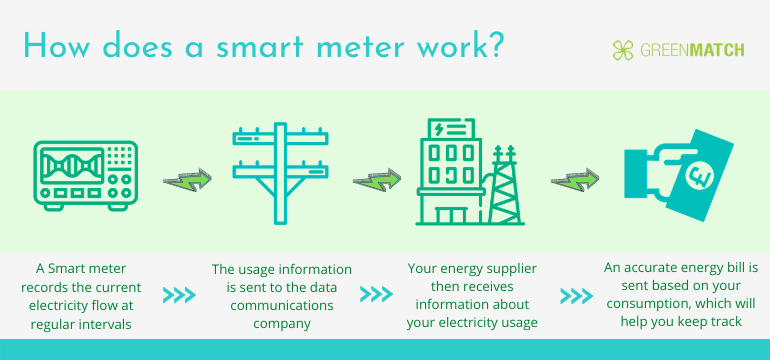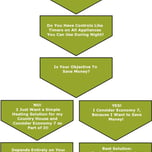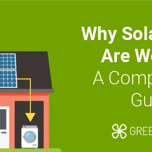- GreenMatch
- Blog
- Smart Meters and Solar Panels
Can Smart Meters Work with Solar Panels? October 2025

How Smart Meters Help Monitor Your Energy Consumption
Smart meters are a relatively new governmental initiative in cooperation with energy supplying companies. It aims at providing each household with access to the new smart devices. Most importantly, in this way, the British government also seeks to cut down the country’s carbon footprint.
Smart meters are equipped to show the exact and real-time consumption of electricity so that the consumer is aware of their solar energy usage and can act on reducing it. However, there have been some technical issues connected to smart meter devices which made the government push back the rollout deadline.
Some of the issues were connected to households that have smart meters and solar panels fitted together. If you're considering solar panels for your home, this is a good time because on the bright side, with the introduction of the second generation smart meters (SMETS 2) most of the smart meter flaws were resolved.
In this article, you will be able to learn more about smart meters and their compatibility with solar panels.
What Are Smart Meters?
Smart meters are basically a smart upgrade of the old gas and electricity meters and according to the governmental rollout, all households are supposed to have one by 2020. A smart meter can read your exact energy usage in real-time and send it automatically to your energy supplier. This means that the new technology also puts an end to the estimated energy bills.
Furthermore, smart meters are coming together with a portable device called, In Home Display, which shows the electricity and gas consumption in pounds and pence. The device comes with the option of providing the consumer with different ways on how they can decrease their energy usage while reducing their bills.
Smart meters can also be fitted with your gas boilers and electric boilers. However, you should also be aware that these are two different smart meters – gas smart metering equipment (GSME) and electric smart metering equipment (ESME).
What's the Difference between First and Second Generation Smart Meters?
While the first wave of smart meter installations was executed with first-generation smart meter devices (SMETS 1), there have been a lot of issues connected to them. One of the most common problems was that the smart meter could go ‘dumb’ or stop recording when the consumer is changing suppliers.
Most of the first-generation smart meters were using a 3G mobile network. Another problem connected to the old devices was that there wasn’t a unified network that manages the smart meters and therefore the devices were going ‘dumb’ when switching suppliers.
In other words, the smart meter would stop sending automatic readings to the new energy supplier and manual readings would be requested. Therefore, the government pushed the deadline for the smart meter rollout and companies came up with the improved second generation smart meter devices (SMETS 2).
The new devices are an upgraded version of their predecessors and most of the issues were cleared. The second-generation devices were launched in 2018 and a special network (WAN - Wide Area Network) was built so that all suppliers can manage them.
Are Energy Suppliers Using Smart Meters?
Most importantly, the new smart meters work with solar panels and other photovoltaic systems. They allow the consumer to see exactly how much energy they are using from their solar installations and how much they are importing from the grid. Furthermore, the same is valid for the export of solar energy back to the grid.
However, there are still some energy providers that haven’t set up their systems to read the energy generated and exported by solar panels and other renewable installations. One such example is E.On. On the other hand, some of the energy providers that do have smart meters compatible with solar panels include EDF Energy, British Gas, First Utility, Ovo Energy, Utilita, Bulb, and Octopus.
How Do Smart Meters Work?
What makes the smart meters smart is that they can communicate with other devices and send energy information directly to your supplier. In order for the smart meters to start communicating properly, the Wide Area Network was created.

It allows the smart meters to exchange information with other meters and in most cases, the Data Communications Company (DCC), which was established by the British government solely for this reason. The DCC will gather the data from the smart meters and send it to the respective energy supplier.
In different areas in the UK, the communication between the smart meters and the DCC can vary. In some cases, the smart meters will communicate directly with DCC, whereas in other, the smart meter will exchange information with other smart meters until it reaches one that is directly connected to the Data Communication Company.
Furthermore, the smart meter communicates with the In Home Display through a Home Area Network (HAN). The network resembles a regular home wireless broadband network and supports the exchange of information between the smart meter, the In Home Display and other smart devices when they are applicable.
Smart meters can be installed either at the same point of the solar panel installation process, or afterwards.
Are Smart Meters Mandatory?
Smart Meters are not mandatory just yet, however, the British government wants every household to be equipped with one by 2020. Furthermore, if the consumer chooses not to have a smart meter fitted, they may not be granted access to some of the tariffs on the market. Additionally, even if the customer refuses to have a smart meter fitted now, they will still be eligible to get one for free later on. This, along with available solar panels grants, it can aid in reducing your costs in the long term.
Even though energy companies are expected to stop providing customers with first-generation smart meters, the consumer should still take into consideration the compatibility of the smart meter with their solar panels if they have such installed. For this purpose, they should consult with their energy supplier.
Is It Worth Getting a Smart Meter?
As with everything in this world, smart meters also have their benefits and drawbacks. Here are some of the things you should consider before agreeing to install one:
- Eliminates the cost of meter readings.
- Eliminates the need for estimated bills, by bringing in accuracy.
- Real time information gives you the opportunity to control your consumption.
- Highest safety standards are ensured with smart meters.
- They may have poor signal at times.
- Smart meters cannot directly save you money. They only provide information to understand your consumption.
- Not all suppliers support smart meters.
Smart meters are a great option because you don’t need to submit meter readings anymore. Your electricity usage will now be sent automatically. Another advantage of having a smart meter is that your bills will be more accurate. This means there are no estimated bills anymore and there’s less room to make human mistakes. Having a smart meter will also allow you to have greater control of your energy usage.
As you can see how much your energy costs, you could be able to manage your usage and you’re always on track. The installation process of a smart meter could be a way to detect potential electrical or gas safety issues at home. The installers are professionally trained to make sure the highest safety standards are applied and maintained.
With a smart meter, you could also manage your energy usage more wisely and avoid any wastage. This way you could contribute to our planet. Last but not least, as everything is being modernised, smart meters are becoming more and more popular. This means there are more suppliers on the market offering exclusive tariffs to households that have one.
Of course, there are also disadvantages of smart meters. One of the pitfalls could be a poor signal. In some areas, it might occur that the mobile signal is a little bit lacking. Another drawback of a small meter is that it won’t just reduce your bills on its own. You will notice some reduction in bills, but not a reduction in your usage by itself.
So a smart meter will only give you useful energy information, in order for you to make the right decisions about your energy usage. Eventually, it’s still up to you to make the necessary changes to save money. Lastly, there might be some suppliers that don’t support or offer smart meters.
How Smart Meters Work with Government Schemes
Feed-in Tariff
Although the Feed-in tariff scheme ended in 2019, the ones who are registered can still benefit from it. It is a governmental scheme incentive which was designed to make renewable energy more accessible to UK households. For instance, the cost of solar panels in Scotland decreased by about 70% since 2010. Smart readers will help you to measure how much energy you are generating and give you the opportunity to export the energy that you don’t use.
The Feed-in Tariff ended in the UK in April 2019. The reason for this is that the renewable technologies covered by the scheme have become more affordable, and thus more widely accessible.
Smart Export Guarantee
The Smart Export Guarantee (SEG) is a necessary step decided by the government after the end of the Feed-in-Tariff. This applies to all new applicants from April 2019.
The SEG is mandatory for all licensed electricity suppliers. With the end of the Feed-in Tariff, the government has requested energy suppliers to provide financial support to small-scale, low-carbon heating generators. The numerous smart export guarantee rates enable these generators to receive payments for the extra energy they export back to the grid.
Under the SEG, everyone who owns a solar panel system with at least a 5MW capacity is entitled. Your 5kW solar system with battery in the UK would be eligible for the Smart Export Guarantee. Additionally, the house must have a smart meter so the exports can be measured. Solar storage is also included in the new scheme.
The SEG was implemented on 1 January 2020.
FAQ about Smart Meters and Solar Panels
Yes, you can have both smart meters and solar panels installed. However, you should bear in mind that not all energy suppliers have set up their smart meters to read the exported energy by the solar panels.
Yes, you can change your supplier if you already have a smart meter installed. However, you should bear in mind that if you have a first generation smart meter, your new supplier might not be able to operate it automatically and manual readings might be requested. Therefore, you should first consult with them before proceeding with the change.
Smart meters are installed for free by the energy supplying companies. However, like your current meter, you will be paying the cost of the smart meter itself and a maintenance fee with your energy bill.
Yes, you can refuse to have a smart meter installed. However, according to the latest news from the government, households that refuse to have a smart meter installed are risking a big rise in their electricity bills as the rollout is progressing. This is because it will get more expensive for the energy supplier to execute manual readings compared to the readings provided automatically by the smart meter.
The British government and the Data Communications Company (DCC) have launched an enrolment and adoption program aiming to switch the first generation smart meters to the new Wide Area Network (WAN), so that they can regain their smart functions. This also means that the smart meter will be able to send automatic readings to your new supplier again.
The smart meters don’t need WiFi in order to operate. As explained in the “How Do Smart Meters Work” section, they use a specially created wireless network called Wide Area Network. This means that the smart meter will not use your WiFi nor interfere with it.On the other hand, some of the In-Home Display devices can be connected to the WiFi. However, that is not mandatory. You will still be able to see your exact usage of electricity even if the In-Home Display is not connected to your WiFi. Furthermore, most of the devices use around 20MB per day, which equals 600MB per month.
It is very unlikely the smart meter to be hacked. The second generation smart meters (SMETS 2) and soon all of the first generation smart meters (SMETS 1) are using a specially created network (WAN) to communicate the consumers’ energy usage. The WAN is a closed network, accessible only by people with the right security keys.Furthermore, all the messages are encrypted and only the receiving party can open them. Last but not least, the security system of the smart meters is operated by the GCHQ’s National Cyber Security Centre, which can further guarantee its quality.
Fill in the form in just 1 minute

Valli has been writing well researched articles about renewable energy, sustainability and green technologies for GreenMatch since 2017. Her work has been published in various media such as Entrepreneur, Business Insider, Canadian Geographic, uSwitch, and eCycle.
We strive to connect our customers with the right product and supplier. Would you like to be part of GreenMatch?

Stay up to date with energy saving tips and grant alerts
Receive offers, marketing and promotions via email from Leads.io about GreenMatch and our brands/partners to help you save.
Thank you for subscribing to our newsletter!
Your email has been successfully added to our list. We look forward to sharing our latest updates with you soon!



